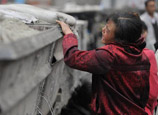
LANZHOU, March 13 (Xinhua) -- At 41, farmer Li Quanguo is already a rich man by the standards of his hometown in the western province of Gansu.
In a place known for prolonged droughts and grinding poverty, Li rakes in an annual income of 200,000 yuan (31,880 U.S. dollars), standing out among locals in Shandan County where the average is 7,300 yuan.
Soon, more farmers could join him in boosting their incomes as policies are being heatedly discussed at China's ongoing parliamentary session to encourage the spread of the large-scale and specialized agriculture that has served Li so well.
The key to his success lies in scale production -- improved grain breeds and advanced technologies thrive on his farm, which extends 86 hectares over the jurisdiction of two villages.
"The larger the farm, the lower the costs, and the more say we have when bargaining with our buyers; these are benefits small farms can not enjoy," Li says.
In Shandan, Li is one of many "rural new rich" who have shot to fortunes thanks to the country's relaxation of land transfer policies, which allow farmers to rent or merge their land for efficient production.
Such practices were once in a legal plight, as China places its rural land under collective ownership, giving farmers management rights over only the small patch of land contracted to them.
In the era when land transfers had not received the official nod, farmers were confined to a small patch of land, and the fragmentation of farmland was believed to have complicated the use of large machinery and curbed agricultural output.
In the recent years characterized by fast-track urbanization in China, farmers have swarmed to cities to seek better-paying jobs, leaving land in places like Shandan largely uncared for.
Li sensed the opportunity when China moved to legalize land transfers in 2008. Over the next five years, he expanded his 0.2-hectare farm by leasing plots from more than 700 villagers.
"In the past, when our lands were limited to a small area, villagers grew wheat on a considerable proportion of land for self-sufficient purpose, despite the fact that wheat had poor harvests here," he explains.
"But when farming turned into a big business, more land could go for profitable crops such as potatoes and onions; and big orders of seeds and fertilizer can ensure deeper discounts in price."
Li's farm employs some 60 farmers, who receive both rental fees from land transfers and a decent pay for their farm labor.
According to Li Fengwu, an official in charge of urban management in Shandan, 26,000 farmers in the county have leased out their land, and can improve their incomes now that they have freed up time to also work in the service industry.
"This doesn't mean they have been stripped of their property because they still hold management rights over the land and can reclaim it if they choose to do so," the official says.
Across China, other forms of large-scale farming, including cooperative farms, in which farmers pool land, funds and manpower, are also picking up steam and winning support from the government.
Issued in January 2013, China's first policy document for the year, dubbed the No.1 central policy, stated that the government will create policies to speed up rural land transfers and grant more subsidies to large-scale landholders, family farms and rural cooperatives to encourage the establishment of large-scale and specialized farming.
The policy guideline, the details of which are currently being thrashed out at the annual session of the 12th National People's Congress, has sent ripples of excitement through Shandan. Nearly half of its land is in the hands of 440 large landholders like Li.
"I'd like to jump on the policy bandwagon and expand my farm to 146 hectares this spring, and hopefully my annual income can more than double to 500,000 yuan," the successful farmer says.
















 How we face 'getting old before getting rich'
How we face 'getting old before getting rich'


![]()
